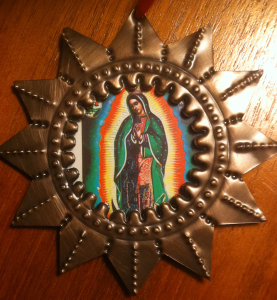I can tell you precisely what I did on the night of December 12, 2000. It was our first December in our little home in Lake Worth, and Seth and I were at the table eating dinner when suddenly we heard the sound of fireworks above us. We both dropped our forks and ran out the back door to look into the night sky and sure enough there were fireworks exploding in the sky to the south of our house, toward Downtown Lake Worth. Since Lake Worth has a large Mexican and Mayan population, and since it was the 12th of December, we decided there was only one explanation for the fireworks: It was the Feast Day of Our Lady of Guadalupe, and there was a big festival going on downtown. We didn’t even bother to clean up or finish dinner but instead hopped into the truck and headed downtown for the festivities. We drove to Bryant Park on the lagoon, but it was silent, and so were the grounds of Sacred Heart Church as well as the plaza off the City Hall Annex and none of the downtown streets were blocked off, either, for this wonderful festival that we had concocted in our own minds.
I had left the house that night all excited to buy the traditional painted tin ornaments from Mexico that I would find at the festival celebrating Our Lady of Guadalupe… but of course there was no festival and there were no ornaments. And while the “about” page of this blog explains a lot about how the Convivio Book of Days project came to be, it doesn’t say much about the beginnings of the Convivio Book of Days Catalog, which came about as a result of me trying to find things I loved from my childhood, like traditional German advent calendars and German woodcrafts––things not easily found in stores. And that December 12 night of disappointment played a big part in that decision, too: If I couldn’t find a store or street vendor to buy painted tin ornaments from, well then, I’d go to the source and start selling them myself. And so it goes. The Convivio Book of Days Catalog does not make a lot of money for anyone, but it does go a long way toward making a lot of folks happy, and that’s what matters most to me.
So we can add Our Lady of Guadalupe to the list of influences on the Book of Days project. Not a bad influence to have. She is sacred to Latin America and especially to Mexico, and her iconic image is one we know well, especially in places like Lake Worth, where there is a strong Latin American influence. The story goes that Juan Diego, just a regular old joe, saw an apparition of a woman on a hill near Mexico City, and she asked him to build a church in her honor there on the hill. She spoke to him in his native Nahuatl language and he recognized her, by the things she told him, as the Virgin Mary.
The image we know so well miraculously appeared inside Juan Diego’s cloak in December, 1531: in one of his visits to the hill, Mary told Juan Diego to go to the barren top of the hill, but when he got there, he found it not at all barren but awash with blooming Castilian roses. He and Mary gathered the roses and she arranged them inside his cloak. And on this, her feast day, Juan Diego opened his cloak before the bishop of Mexico City. When he did, the flowers all fell to the floor, revealing the image of the Virgin of Guadalupe, and this is the very image we know so well. The church was built, and the image from Juan Diego’s cloak, or tilma, hangs to this day inside the Basilica of Our Lady of Guadalupe on Tepeyac Hill, Mexico City.
Image: One of the many tin ornaments we offer in the Convivio Book of Days Catalog.
